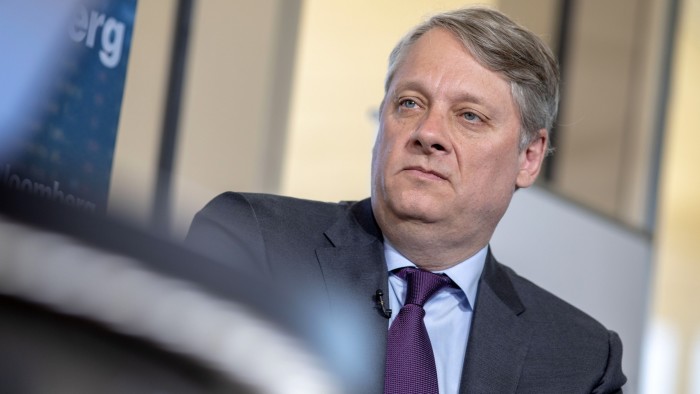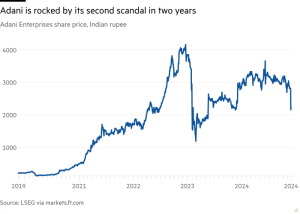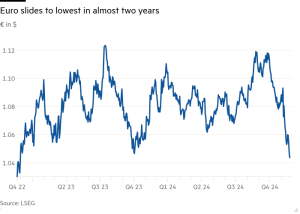US economy could ‘overheat’ under Donald Trump, warns bond giant Pimco

Unlock the White House Watch newsletter for free
Your guide to what the 2024 US election means for Washington and the world
Pimco, one of the world’s biggest bond fund managers, has warned that US president-elect Donald Trump’s economic plans could lead to the economy “overheating” and could halt interest rate cuts, posing a danger for stocks that shot up in the wake of his presidential election victory.
Dan Ivascyn, chief investment officer at Pimco, said US equity markets could suffer a reversal after rising sharply on the Republican candidate’s emphatic win. The S&P and Nasdaq Composite indices both surged to fresh record highs this week in anticipation of tax cuts, looser regulation and trade tariffs.
But such “reflationary” policies, in a US economy that already has “a lot of momentum”, have the potential to feed through into inflation, he warned.
“It’s not as simple and easy as just a one-way reflationary trade where risk assets should rejoice,” Ivascyn told the Financial Times.
“You want to be a little careful about what you wish for,” he said. With US inflation still stuck above the Federal Reserve’s target, “there is some risk that some of this exuberance can work its way back into both inflationary expectations or actual inflation”.
He said Trump’s policies “are coming at a time where you already have a lot of positive growth momentum, they could lead to this overheating”.
Ivascyn’s comments echo concerns held by some other investors and strategists that the reaction to this week’s election result across riskier asset classes stands at odds with the potential for rising inflation and a prolonged period of tight monetary policy. Expectations on the path of US interest rates have been a key driver of US markets in recent years.
While the S&P 500 has risen by more than 4 per cent this week, putting it on course for its biggest weekly gain this year, Trump’s victory has also pushed bitcoin to record highs and driven junk bond spreads — the premium paid by low-grade borrowers to issue debt over the Treasury — to a 17-year low.
However, government bonds initially sold off sharply earlier this week in expectation of higher inflation, although the 10-year Treasury has since made back those losses after Fed chair Jay Powell said it was too early to know what the substance of Trump’s policies would be.
While Ivascyn was not expecting a “massive inflation”, he said Trump’s policies could support growth over the long run and warned that “we certainly could get back to a point where the Fed becomes a bit concerned and where the market begins to price out some of the cuts”.
“So, we think that means: be a little careful of risk asset valuations here,” he said.
The central bank has already started to slow the pace of monetary policy easing following a flurry of strong economic data in recent weeks, notwithstanding a weak October jobs report distorted by strikes and hurricanes.
It cut rates by 0.25 percentage points on Thursday to a target range of 4.5 to 4.75 per cent, having made a jumbo-sized half-point cut as recently as September — the first reduction since 2020.
Market pricing this week indicated that traders have also started to scale back their bets on Fed easing for 2025, and now anticipate less than 1 percentage point worth of cuts by the end of next year.
Ivascyn said the “bar will be high” for rates to rise again, speaking ahead of the Fed announcement, but “a more realistic scenario will just be them on hold for a lot longer than people realise”.
That would not be “a friendly scenario to the commercial real estate market”, he said. “That could present some problems to some of these sectors that have rallied more recently in the hopes of central bank cuts.”
Still, even before central bank policymakers need to step in, Ivascyn pointed out that “the markets a lot of times do the heavy lifting for the Fed”, meaning that markets could start to price in a change in the outlook for inflation and rates without the central bank needing to signal this.
At a certain stage, bets on rising inflation and elevated interest rates could send Treasury yields up to such a level that they compete with equities as an attractive investment, dampening their appeal, said Ivascyn.
“There are practical limits to how high rates can go before they begin to negatively impact risk assets” and “that could lead to a reversal in some of this positive market sentiment, positive economic momentum”, he said.
“The markets will be a governor of sorts.”
#economy #overheat #Donald #Trump #warns #bond #giant #Pimco





